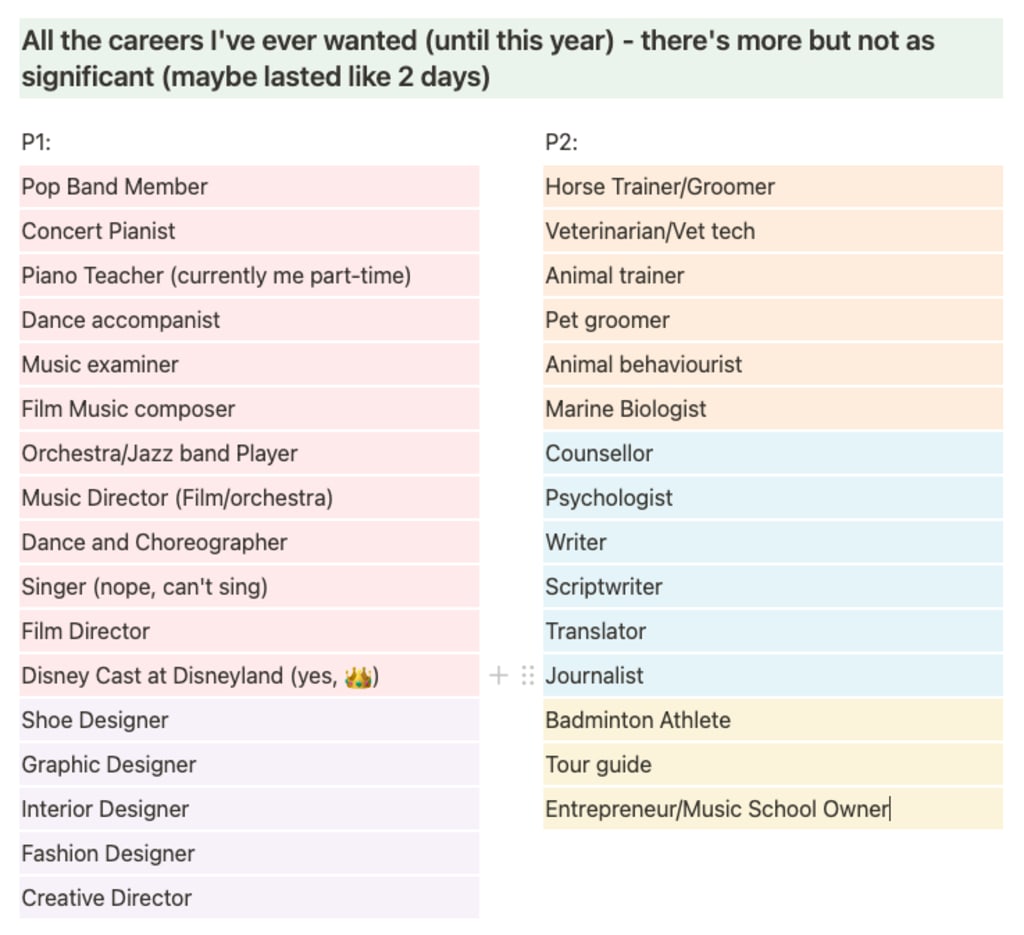
This list excludes the typical doctor/lawyer/Banker answer given when I was first asked in school and had to provide answers to a question I had never thought of before.
Growing up, I have a long list of hobbies and an equal, if not even a longer list of dream jobs. I compiled a list with everything I've ever called my dream job since I was a kid for as long as I can remember. It's a long, long list. Refer to the list above. I've never stuck to one long enough before I switched to another.
Some of these I've gone back to more than once, after losing interest in them and gaining interest in new ones. All my life, till recently, I've always had many variations of a dream job. The definition never changed for me — the job did. I've always envisioned a dream job that makes me excited to get out of bed in the morning, filled with purpose and hope towards work. Something meaningful to me that I'm passionate about. Something that pays enough to get by but makes me a happy, hopeful worker. I wanted it to be the exact opposite of everything I felt towards school growing up — dread, obligation, and having to put in more effort into work I'm barely interested in.
Knowing that my dream job has always changed frequently, does make me question...do I even have a dream job? I know I've always wanted one — but does that even exist for me? Because I only had an idea and definition without any concrete idea of how that translates to reality, maybe I'm only in love with that idea, not the reality. Here are some reasons why, and if that resonates with you, it's okay.

#1 Bringing Any Skill to a Professional level, to be completely honest, is difficult
Until I got into a degree programme, I've never really realised how hard this is. This is why everyone I know is struggling in degree and diploma programmes. We're being trained to become professionals. These high-level skills (in any field) demands a lot of tenacity and intense training. Especially jobs that require specific qualifications (like a doctor or a lawyer). For some, the demand for certification might be slightly lower and rely less on formal training to prepare you for the career. These jobs lean more towards gaining experience and skill level. Many other musicians I know often say that you don't necessarily need a music degree to become a musician. It's a good headstart but not a need, except for professions like teaching or research.
Either way, it's tough as hell. Though it's a path that we have to take to get to where we want to be. It's tiring, though definitely worth it. The time and effort invested in any professional skill in most (if not all) fields are demanding and can be draining.
This is normal in every field, and it’s not that I’m not willing to put in the effort, but…
#2 Try juggling 3-5 other interests along with that
It is well known that trying to be a master at one thing takes years of dedicated practice and study. Just like what was mentioned in Malcolm Gladwell’s book Outliers, it takes 10,000 hours of intensive practice to achieve mastery of complex skills and materials. (Source) Even if that's not exactly true (many sources have tried debunking it), it does make sense.
Having multiple interests can only mean that your time and effort is divided. That would mean that the overall progression for each skill would be slower. I have trouble deciding on one to stick with long enough before switching to the next.
With the lack of persistent focus, turning any passion into a profession would be tough. I'm just able to perform and not skilled enough to become a professional in any of those fields. It may take a while. I also know that there were phases where I couldn't stop obsessing and clinging onto any old or new dream professions since I'm so damn lost. I went back to old ideas because my interests persisted. But again, not long before I bounced back to the same vicious cycle. Yeap, I'm a mess.
It is, however, possible to turn some of these interests into a side hustle, though. But it can get tiring and you can experience burnout even with a system in place. You're working most of your waking hours. It's not for everyone. Also, multiple side hustles without a stable income can't always pay a living. I want something stable. I love stability.
This is not to say that you can strictly only focus on one thing at a time. But if that tips off the balance between your side interests and full-time work (which honestly at times, is the case for me), it can be a tough nut to crack. I've never thought to have one job. I googled how to have 2 careers a few years ago and was so happy that it exists.
#3 Our interests may change over time
As we grow older, our interests change too. What if our dream job is no longer our dream job? Some people work towards it their whole life only to find out at the end that it's no longer what they want, or that it doesn't suit them. Our interests in people and things don't change only as kids, but as adults too. It's human nature. We change throughout our lives — people can be fickle.
Many new dream jobs have also emerged that didn't exist merely years ago. Change is the only constant, ironically. For some people, their lifelong passion remains. For others, their passion change throughout their lives. One person could have so many dream jobs during the different phases in their lives too.
I'm a lifelong student at heart. I love learning new things — anything that interests me enough goes into my ultimate goals list (of skills I want to learn). My passions, separated from the rest of my other hobbies, has never changed. Music, dance, animal. But I do switch around as I get obsessed with one more than the other as it rotates. It sounds confusing, and it sure is.
While doing my internship near the end of my music diploma programme, I volunteered at a vet clinic to help me decide if I should change and study to become a professional vet technician. That lasted for 2 months before I auditioned as a classical pianist at my current college and decided that the vet life isn't for me. It's indeed hard to stick to one without being indecisive. Yeap, the confusing story of my life.
#3 Everything feels like work no matter how much you enjoy it
Everything, no matter how much you love it is work, as long as you're being paid. Doing what you love for yourself and for a living feels different. For yourself, you could choose the premise to work within; as a musician, you could just learn to play a specific or a few genres, and you don't have to master them unless you want to.
To get paid, there's competition all around you. You need to be excellent at your job, or someone else's gonna take it. Pleasing clients and their expectations, along with marketing your work serve as the other half of the game. To be a professional, you either have to be versatile enough to meet clients' expectations or deeply specialise in one skill.
Being a jack of all trades can make you a valuable asset, especially in startups. Feel free to check out the previous article (episode 1) to find out why that is.
Having a dream job also doesn't always mean you will enjoy it all the time. There will be lows, burnouts, and exhaustion. For some, it can ruin the passion by turning it from a leisure activity for relieving stress to an obligation and a big responsibility towards their livelihood. I'm sure this is the last thing anyone would want to happen to them. For those who have never experienced this, I'm so happy for you, you lucky one.
#4: Not everyone will be willing to pay you for doing what you love
This may sound pessimistic, but it's true. Certain industries value things other than, or even more than, their workers' skills (especially with an abundance of skilled workers). For example, I've watched many videos of professional ballerinas who talked about being discriminated against in their previous companies for not having that ideal figure. This is true in entertainment and is well known in the modelling industry to different extents as well. There are also other physical requirements that are beyond your control, such as height requirements if you wish to become an air stewardess or a pilot.
On the other hand, maybe you don't face these issues. But, if what you love doing doesn't serve, entertain, or educate others, it can be hard to make a living. For example, not many people would pay for content made by some random someone in the world if it does not provide any of these values. In a time where information overload is one of the most common things, the least anyone would be willing to pay for is entertainment.
#5 It's okay to not have a dream job— it's a job, it's meant to support you
Lastly, it is completely okay to not have a dream job. It's okay to just work for a living, a stable paycheck that supports your life and life goals. Careers and jobs take up the bulk of your time, but they're not everything. Loving your job is cool and blissful, but not loving it is cool too. Sometimes I forget that since I'm so insistent on finding one and not settling.
It is completely okay to live for your hobbies, side hustles, and the other things and people that make you happy. As long as your job is something you don't mind doing, supports you financially and gives you time to do the things you want to, it's good enough.
After going through the life of a freelancer (internship role as a film composer assistant), I decided that I value work-life balance so much more. I no longer wish to work on my sick days when I'd rather rot in bed. Living life is so important to me. I'd like to clock out mentally once I physically clock out from work.
It's okay to not be at the top of the career chain, and it's okay to just be another average employee. A job, in the end, is still a job. It already takes up so much of our time daily. I don't want it to affect and potentially sacrifice other aspects of my life (family and mental health, for example) for my career either.
Final Thoughts
Having a dream job does not instantly make you happy or hopeful. Sure it can make life so much better, having the bulk of your time doing what you love and getting paid for it. But it's also okay to not have one. I've pretty much accepted the fact that it doesn't exist — at least for me, even though I'm graduating college in another 1.5 years into working adult life.
You can still feel burned out, tired, and still want a break while working your dream job. I've always been envious of those who do have a dream job. Maybe, just maybe, that's not going to be me anytime soon. I just have to learn to embrace that and continue going out and experiencing everything I possibly can with an open mind to see what works for me.
The internet only has information, and almost everything looks good on paper. Without hands-on experience, there's no way to know what works for you. That's why job shadowing, internships and volunteer work exist. I found out the vet life didn't work for me when I volunteered at a clinic. So that's crossed off my list.
About the Creator
Ashley
Musician | Latin Dancer | Animal Lover | A Creative | Avid Reader | Writer. I write about everything I am, everything I do and more, on life in general.






Comments
There are no comments for this story
Be the first to respond and start the conversation.